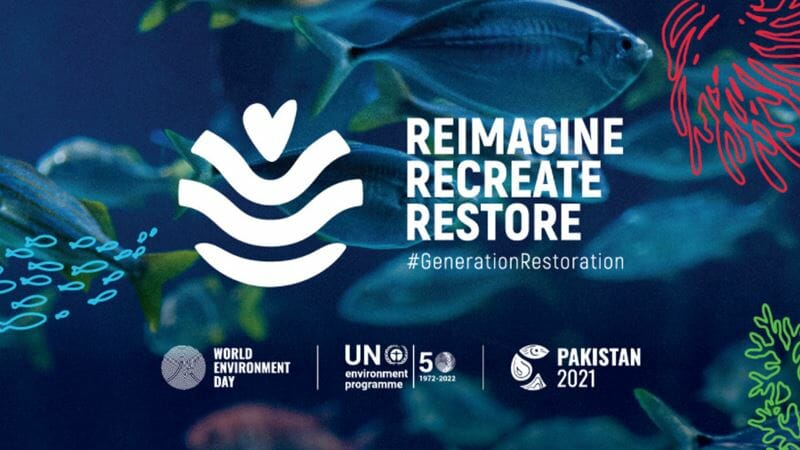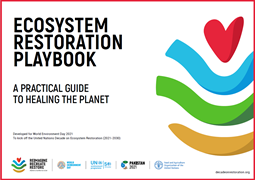World Environment Day is celebrated on the 5th of June every year and is the United Nation's principal vehicle for encouraging awareness and action for the protection of our environment.
First held in 1974, it has been a flagship campaign for raising awareness on emerging environmental issues from marine pollution, human overpopulation, and global warming, to sustainable consumption and wildlife crime.
Source: Wikipedia
World Environment Day 2021

The theme for World Environment Day 2021 is “Ecosystem Restoration” and will see the launch of the UN Decade on Ecosystem Restoration.
Ecosystem restoration can take many forms: Growing trees, greening cities, rewilding gardens, changing diets or cleaning up rivers and coasts. This is the generation that can make peace with nature.
Did you know?
- Restoration and other natural solutions can deliver one third of the mitigation needed by 2030 to keep global warming below 2C while also helping societies and economies adapt to climate change.
- Ecosystem degradation is already affecting the well-being of at least 3.2 billion people – 40% of the world’s population.
- Every year, the world loses 10 million hectares of forests – an area the size of the Republic of Korea, or twice the size of Costa Rica.
- Forests provide drinking water to one-third of the world’s largest cities; they also support 80%, 75% and 68% of all amphibian, bird, and mammal species, respectively.
- Street trees provide a reduction of around 0.5 to 2.0° C in summer maximum air temperatures, benefiting at least 68 million people.
- Approximately 30% of natural freshwater ecosystems have disappeared since 1970.
Ecosystem Restoration Playbook

A PRACTICAL GUIDE TO HEALING THE PLANET
To encourage the revival of ecosystems everywhere, UNEP has published a practical guide to ecosystem restoration. Released at the start of the UN Decade on Ecosystem Restoration 2021-2030, the Ecosystem Restoration Playbook provides an introduction to the range of actions that can slow and halt the degradation of ecosystems and foster their recovery.
Here are some simple actions you can take:
- Embracing a plant-rich diet
- Starting an urban garden
- Planting a tree (or many!)
- Cleaning a natural space
- Cutting consumption of single-use products
- Fighting food waste
- Sharing your creative vision for the planet’s future
Looking for more ways to reduce your impact on the environment?
All of us, with small actions, can meditate about the problems we cause on the natural environment and propose solutions to small-scale actions, which is the key to big solutions. Below is a list of 15 further changes you can implement that can have a big impact on our environment.
- Put on an extra layer of clothing instead of turning on the heating;
- Get a water-saving shower head;
- Use rechargeable batteries where possible;
- Read your favourite newspaper publications online instead of reading the paper versions;
- Use eco-friendly cleaning products;
- Pass on the plastic bags by taking your own bags for groceries;
- Borrow books from the library instead of purchasing;
- Avoid buying plastic-wrapped products, opt for a paper bag instead;
- Swap plastic straws for more sustainable ones made from bamboo, paper or steel;
- Say bye to the plastic water bottles;
- Eat less red meat;
- Grow your own herbs, fruit and vegetables;
- Don’t waste food;
- Plant some trees;
- Create a bee hotel.
For more information about World Environment Day please visit worldenvironmentday.global
What makes Horder Healthcare unique
Horder Healthcare is committed to providing the very best quality of care for our patients and customers. We are continuously working on improving and reducing risks and this is reflected in our consistently high CQC results, patient satisfaction questionnaires and minimal levels of infection.
We are a charity
We reinvest our profit to benefit more people and help us achieve our aim of advancing health.






